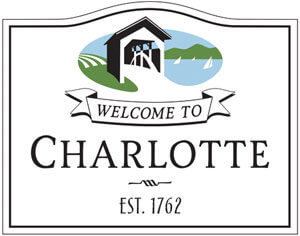Charlotte Town Charter in final weeks before sunset clause takes effect

Unless voters initiate charter extension, the Selectboard budget will return to Town Meeting for approval
In 2016, the Town of Charlotte passed, by Australian ballot, Town Meeting Article 9 by a vote of 1,148 to 349. The article put in place a municipal charter that changed the way Charlotters vote for the Selectboard’s budget. That municipal charter will expire on Town Meeting Day this year unless voters choose to extend it.
Under the current charter, voters discuss and amend all budget-related articles collectively at Town Meeting, but final approval of those articles is decided several weeks later by Australian ballot. However, the charter that put this two-part process in place contains a three-year sunset clause.
Lynn Jaunich, who was on the committee that developed the charter, said, “The only way for the charter to be extended would be a vote via Australian Ballot on Town Meeting Day, or another voting day. I do not know of anyone who has collected a petition with signatures asking for it to be put on the ballot for Town Meeting Day, and I believe the Selectboard has not shown a willingness to do so without one.”
The initial concern of the community group who drafted the charter in 2016 was the distinct possibility at the time that the town’s voters would act to move final approval of the Selectboard’s budget from Town Meeting to Australian ballot, just like the town had done in 2004 with the much-larger school district budget. The charter was an attempt to preserve Town Meeting for purposes of a community-wide discussion of the municipal budget while also providing an opportunity for those who couldn’t attend Town Meeting in person to vote by Australian ballot for or against final approval.
According to Jaunich, the charter has worked as expected. “I think if you look back at the years of voting, the new solution did increase voting on the town budget.” The numbers support her, with 372 more people voting on the final budget by Australian ballot rather than at Town Meeting in 2017, 100 more in 2018, and 66 more in 2019.
Selectboard Chair Matt Krasnow, who was a Selectboard member in 2016 and the author of the sunset clause, is unpersuaded. “I feel this was an important experiment that ultimately did not improve the democratic process.” He went on to say that with the change introduced by the charter, “Town Meeting Day temporarily became a largely ceremonial event…. [It] also incurred an additional monetary cost to the town because we had to hold an additional election in April. By last year, the number of people who voted on the budget in April was almost as low as the number of people who attend Town Meeting itself.”
According to Town Clerk Mary Mead, the additional cost of the April vote has been “in the $400 range.”
Krasnow said he will not propose a charter extension but that he will try to reinvigorate Town Meeting. “Once the Town has reverted to its original democratic process of Town Meeting Day, my goal is to continue the critical and important work of increasing citizen engagement in all town decisions. I also specifically will be working on other ideas to improve access to and participation in Town Meeting Day to build a stronger, more resilient and stable democracy for future generations to enjoy.”

